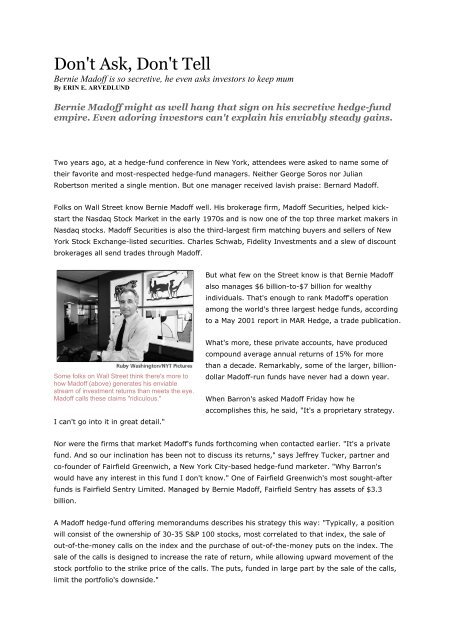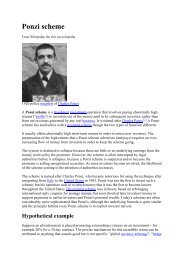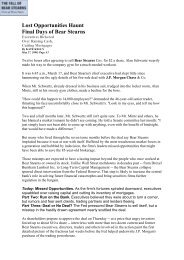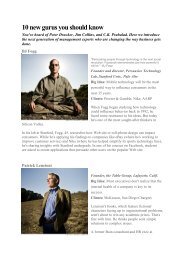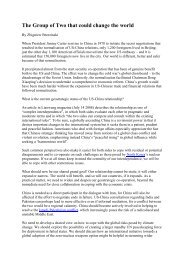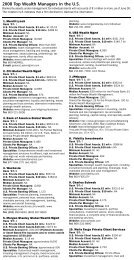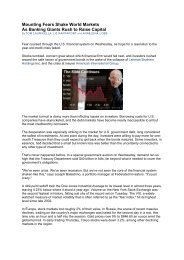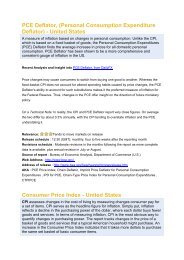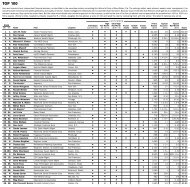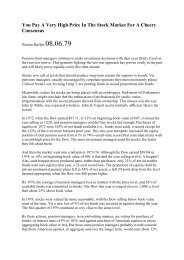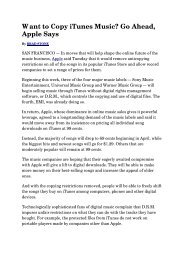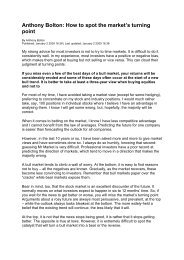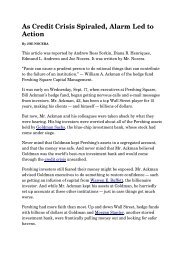Don't Ask, Don't Tell - Morningbull
Don't Ask, Don't Tell - Morningbull
Don't Ask, Don't Tell - Morningbull
Create successful ePaper yourself
Turn your PDF publications into a flip-book with our unique Google optimized e-Paper software.
<strong>Don't</strong> <strong>Ask</strong>, <strong>Don't</strong> <strong>Tell</strong><br />
Bernie Madoff is so secretive, he even asks investors to keep mum<br />
By ERIN E. ARVEDLUND<br />
Bernie Madoff might as well hang that sign on his secretive hedge-fund<br />
empire. Even adoring investors can't explain his enviably steady gains.<br />
Two years ago, at a hedge-fund conference in New York, attendees were asked to name some of<br />
their favorite and most-respected hedge-fund managers. Neither George Soros nor Julian<br />
Robertson merited a single mention. But one manager received lavish praise: Bernard Madoff.<br />
Folks on Wall Street know Bernie Madoff well. His brokerage firm, Madoff Securities, helped kick-<br />
start the Nasdaq Stock Market in the early 1970s and is now one of the top three market makers in<br />
Nasdaq stocks. Madoff Securities is also the third-largest firm matching buyers and sellers of New<br />
York Stock Exchange-listed securities. Charles Schwab, Fidelity Investments and a slew of discount<br />
brokerages all send trades through Madoff.<br />
Some folks on Wall Street think there's more to<br />
how Madoff (above) generates his enviable<br />
stream of investment returns than meets the eye.<br />
Madoff calls these claims "ridiculous."<br />
I can't go into it in great detail."<br />
But what few on the Street know is that Bernie Madoff<br />
also manages $6 billion-to-$7 billion for wealthy<br />
individuals. That's enough to rank Madoff's operation<br />
among the world's three largest hedge funds, according<br />
to a May 2001 report in MAR Hedge, a trade publication.<br />
What's more, these private accounts, have produced<br />
compound average annual returns of 15% for more<br />
than a decade. Remarkably, some of the larger, billion-<br />
dollar Madoff-run funds have never had a down year.<br />
When Barron's asked Madoff Friday how he<br />
accomplishes this, he said, "It's a proprietary strategy.<br />
Nor were the firms that market Madoff's funds forthcoming when contacted earlier. "It's a private<br />
fund. And so our inclination has been not to discuss its returns," says Jeffrey Tucker, partner and<br />
co-founder of Fairfield Greenwich, a New York City-based hedge-fund marketer. "Why Barron's<br />
would have any interest in this fund I don't know." One of Fairfield Greenwich's most sought-after<br />
funds is Fairfield Sentry Limited. Managed by Bernie Madoff, Fairfield Sentry has assets of $3.3<br />
billion.<br />
A Madoff hedge-fund offering memorandums describes his strategy this way: "Typically, a position<br />
will consist of the ownership of 30-35 S&P 100 stocks, most correlated to that index, the sale of<br />
out-of-the-money calls on the index and the purchase of out-of-the-money puts on the index. The<br />
sale of the calls is designed to increase the rate of return, while allowing upward movement of the<br />
stock portfolio to the strike price of the calls. The puts, funded in large part by the sale of the calls,<br />
limit the portfolio's downside."
Among options traders, that's known as the "split-strike conversion" strategy. In layman's terms, it<br />
means Madoff invests primarily in the largest stocks in the S&P 100 index -- names like General<br />
Electric , Intel and Coca-Cola . At the same time, he buys and sells options against those stocks. For<br />
example, Madoff might purchase shares of GE and sell a call option on a comparable number of<br />
shares -- that is, an option to buy the shares at a fixed price at a future date. At the same time, he<br />
would buy a put option on the stock, which gives him the right to sell shares at a fixed price at a<br />
future date.<br />
The strategy, in effect, creates a boundary on a stock, limiting its upside while at the same time<br />
protecting against a sharp decline in the share price. When done correctly, this so-called marketneutral<br />
strategy produces positive returns no matter which way the market goes.<br />
Using this split-strike conversion strategy, Fairfield Sentry Limited has had only four down months<br />
since inception in 1989. In 1990, Fairfield Sentry was up 27%. In the ensuing decade, it returned<br />
no less than 11% in any year, and sometimes as high as 18%. Last year, Fairfield Sentry returned<br />
11.55% and so far in 2001, the fund is up 3.52%.<br />
Those returns have been so consistent that some on the Street have begun speculating that<br />
Madoff's market-making operation subsidizes and smooths his hedge-fund returns.<br />
How might Madoff Securities do this? Access to such a huge capital base could allow Madoff to<br />
make much larger bets -- with very little risk -- than it could otherwise. It would work like this:<br />
Madoff Securities stands in the middle of a tremendous river of orders, which means that its<br />
traders have advance knowledge, if only by a few seconds, of what big customers are buying and<br />
selling. By hopping on the bandwagon, the market maker could effectively lock in profits. In such a<br />
case, throwing a little cash back to the hedge funds would be no big deal.<br />
When Barron's ran that scenario by Madoff, he dismissed it as "ridiculous."<br />
Still, some on Wall Street remain skeptical about how Madoff achieves such stunning double-digit<br />
returns using options alone. The recent MAR Hedge report, for example, cited more than a dozen<br />
hedge fund professionals, including current and former Madoff traders, who questioned why no one<br />
had been able to duplicate Madoff's returns using this strategy. Likewise, three option strategists at<br />
major investment banks told Barron's they couldn't understand how Madoff churns out such<br />
numbers. Adds a former Madoff investor: "Anybody who's a seasoned hedge- fund investor knows<br />
the split-strike conversion is not the whole story. To take it at face value is a bit naïve."<br />
Madoff dismisses such skepticism. "Whoever tried to reverse-engineer \, he didn't do a good job. If<br />
he did, these numbers would not be unusual." Curiously, he charges no fees for his moneymanagement<br />
services. Nor does he take a cut of the 1.5% fees marketers like Fairfield Greenwich<br />
charge investors each year. Why not? "We're perfectly happy to just earn commissions on the<br />
trades," he says.<br />
Perhaps so. But consider the sheer scope of the money Madoff would appear to be leaving on the<br />
table. A typical hedge fund charges 1% of assets annually, plus 20% of profits. On a $6 billion fund<br />
generating 15% annual returns, that adds up to $240 million a year.
The lessons of Long-Term Capital Management's collapse are that investors need, or should want,<br />
transparency in their money manager's investment strategy. But Madoff's investors rave about his<br />
performance -- even though they don't understand how he does it. "Even knowledgeable people<br />
can't really tell you what he's doing," one very satisfied investor told Barron's. "People who have all<br />
the trade confirmations and statements still can't define it very well. The only thing I know is that<br />
he's often in cash" when volatility levels get extreme. This investor declined to be quoted by name.<br />
Why? Because Madoff politely requests that his investors not reveal that he runs their money.<br />
"What Madoff told us was, 'If you invest with me, you must never tell anyone that you're invested<br />
with me. It's no one's business what goes on here,'" says an investment manager who took over a<br />
pool of assets that included an investment in a Madoff fund. "When he couldn't explain \ how they<br />
were up or down in a particular month," he added, "I pulled the money out."<br />
For investors who aren't put off by such secrecy, it should be noted that Fairfield and Kingate<br />
Management both market funds managed by Madoff, as does Tremont Advisers , a publicly traded<br />
hedge-fund advisory firm.


